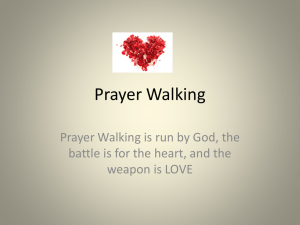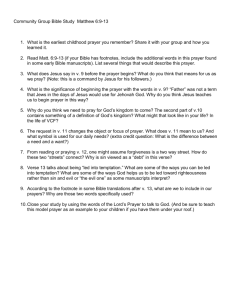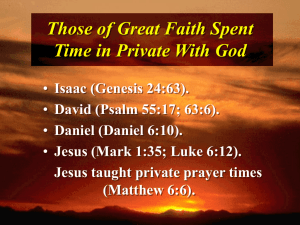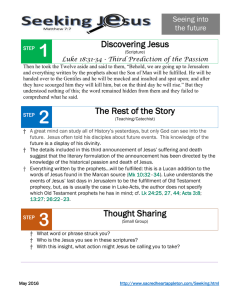July 13
advertisement
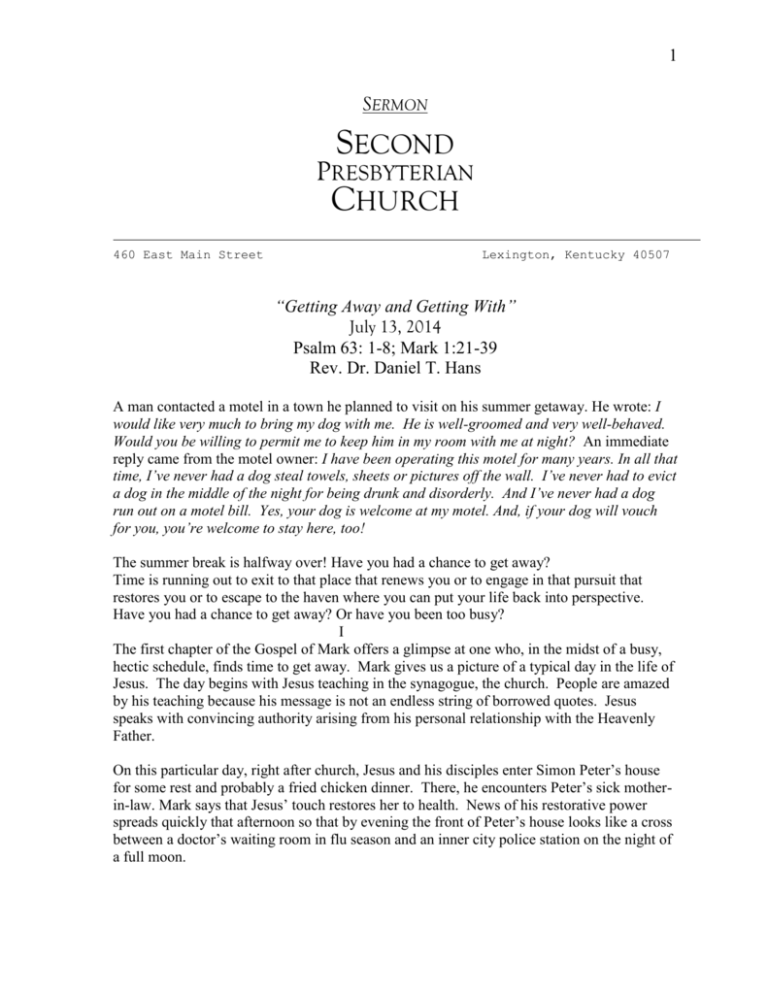
1 SERMON SECOND PRESBYTERIAN CHURCH 460 East Main Street Lexington, Kentucky 40507 “Getting Away and Getting With” July 13, 2014 Psalm 63: 1-8; Mark 1:21-39 Rev. Dr. Daniel T. Hans A man contacted a motel in a town he planned to visit on his summer getaway. He wrote: I would like very much to bring my dog with me. He is well-groomed and very well-behaved. Would you be willing to permit me to keep him in my room with me at night? An immediate reply came from the motel owner: I have been operating this motel for many years. In all that time, I’ve never had a dog steal towels, sheets or pictures off the wall. I’ve never had to evict a dog in the middle of the night for being drunk and disorderly. And I’ve never had a dog run out on a motel bill. Yes, your dog is welcome at my motel. And, if your dog will vouch for you, you’re welcome to stay here, too! The summer break is halfway over! Have you had a chance to get away? Time is running out to exit to that place that renews you or to engage in that pursuit that restores you or to escape to the haven where you can put your life back into perspective. Have you had a chance to get away? Or have you been too busy? I The first chapter of the Gospel of Mark offers a glimpse at one who, in the midst of a busy, hectic schedule, finds time to get away. Mark gives us a picture of a typical day in the life of Jesus. The day begins with Jesus teaching in the synagogue, the church. People are amazed by his teaching because his message is not an endless string of borrowed quotes. Jesus speaks with convincing authority arising from his personal relationship with the Heavenly Father. On this particular day, right after church, Jesus and his disciples enter Simon Peter’s house for some rest and probably a fried chicken dinner. There, he encounters Peter’s sick motherin-law. Mark says that Jesus’ touch restores her to health. News of his restorative power spreads quickly that afternoon so that by evening the front of Peter’s house looks like a cross between a doctor’s waiting room in flu season and an inner city police station on the night of a full moon. 2 Mark slips in a comment that he repeats in his gospel saying that Jesus will not let the demons speak because they know who he is. While Jesus’ healings point to his identity as God’s Sent One it is too early in his ministry for his identity to be fully revealed. Thus Jesus hushes the news about who he is. One incident on this day in the life of Jesus deserves special attention. This particular incident is the catalyst and sustenance for all else that Jesus does. After he works late into the night, the text says: In the morning, while it was still dark, Jesus got up and went to a deserted place and there he prayed. Prayer is an indispensable part of Jesus’ day. For Jesus, prayer is the action of holding on to God who holds on to us. Peter Cartwright was a Methodist evangelist in the mid 1800s in Illinois and he was a political opponent of Abraham Lincoln. The story goes that Cartwright announced that he would preach against the Calvinist Presbyterian doctrine of “once saved by grace, always saved by grace”. Cartwright believed that one could lose or forfeit a saving relationship with God. As the eccentric revivalist began his message in an outdoors service standing on a platform under a large tree, he announced: I promised I’d answer those who believe that once in grace always in grace. He stopped talking, jumped up and grabbed hold of a branch overhead. He held on to the branch suspended in midair for a minute, let go, dropped to the ground, and walked away. End of sermon! A vibrant relationship with God requires staying connected to the source of strength and guidance. For Jesus, prayer is the wellspring that sustains his ability to teach and his power to heal. I see there’s a new movie out about Hercules. In Greek mythology there is a story about Hercules wrestling with the giant Antaeus. Hercules found that every time he threw his enemy to the ground Antaeus arose stronger than before. The earth was the giant’s mother and offered renewing strength to her son. Becoming aware of this, Hercules changed his tactics. Lifting Antaeus high in the air, away from his source of strength, Hercules was able to bring the giant into submission. For Jesus, prayer is a time to connect to the ground of one’s life and strength which is God and a time to hold on to that strength and guidance. II What role does prayer play in our busy, heavily-scheduled lives? Honesty admits that time connected with God receives little attention in a typical day in our lives. And we have our reasons why we don’t pray as we should! I can think of at least five reasons that keep us apart from our grounding and sustaining source of spiritual power. The first reason is simply stated: I’m too busy to pray. It seems no one these days has enough time to pray. In our hectic lifestyles and with our electronic devices that keep our attention focused outward rather than inward, time to get away and get with God is rare. Therefore, such time must be created. Who would claim that Jesus was not a busy person with many external calls for his attention? Yet, he had time for prayer because he made time. I often hear people say: I don’t set aside time to pray each day because I pray throughout the day. While in theory this sounds good, in practice it is suspect. Such an attitude is comparable to the person who says: I don’t set aside time to exercise each day because I exercise throughout the day. Few of us have jobs 3 that provide the physical demands equal to an intentional physical workout. None of us have jobs that provide undistracted, non-preoccupied time for intentional prayer. Not even ministers have jobs like that. In busy lives like ours, meaningful prayer occurs only when we discipline ourselves to fit it into our schedule. While Psalm 63 portrays a person praying while in bed at night, a better time for prayer is in the morning as Jesus did. Early morning is the better time to pray for it is the start of a new day in which we need divine grounding and guidance. Prayer in the morning is less likely to get interrupted and crowded out by the ensuing demands of the day. III A second reason not to pray declares: I get too distracted to pray. A simple response is: remove the distractions by finding “a deserted place to pray.” Jesus never just found himself alone. He had to get away; he had to escape the crowds; he had to create a quiet, private place where he could meet with his Heavenly Father. 17th century Christian philosopher and mathematician, Blaise Pascal, said: All our miseries come from our inability to sit quietly and alone. When was the last time you got away to sit quietly and alone and to take an honest and deep look at your life in the presence of God? As with a time for prayer, so with a place for prayer, we must discipline ourselves to create it. Do you have a sanctuary, a quite and private place, to which you can retreat to be alone and uninterrupted with the Lord? IV Another reason why we don’t pray is the comment: I am a forward-looking person not a backward-looking one? Some people complain that prayer concentrates too much on the past. Reviewing the past is a vital part of prayer. We do so in order to be set free from the past and to be healed from our anxious yesterdays. Prayer is more than contact with God; it is also contact with self. Without the self-probing pursuit of prayer, our faith is like a two dimensional stick figure – lacking any depth. An old peach grower down South told some eager pickers: if you want the best fruit go deeper into the orchard. The peaches along the fringes are picked over. Deeper in the orchard you’ll find the best fruit. Prayer is the occasion to go deeper into the orchard of our souls. We are not ready to move forward with our lives until we have learned to understand our past. We are not ready to reach for the heights of God’s call until we have first reached into the depths of our own lives. Jesus reviewed the previous day’s events in prayer so that he could prepare himself to focus on what was ahead. V A fourth reason not to pray states: I’m a person of action, not reflection. Most Americans are! Action without reflection is a flaw of Western Civilization. Action without reflection can be dangerously misguided. Aristotle warned that the unexamined life is not worth living. Years ago, some Americans were on safari in Africa. They pressed their native baggage carriers to move at a fast pace. The carriers moved with incredible speed carrying heavy loads - until, as a group, they stopped, dropped their loads and sat down. The Americans pleaded with them to continue and asked: 4 Why are you stopping now? The natives replied: We have been moving so fast and working so hard that we have to stop to let our souls catch up with our bodies. Jesus was a man of action – he healed, he taught, he preached. Yet those actions required times of prayerful reflection if the result was to have a greater good and to be part of God’s greater plan. VI Having challenged four of the reasons for not praying, I have to admit there is one legitimate reason not to pray. This rationale belongs to the person who says: I don’t believe in prayer. I have to admit there are some kinds of prayer that I don’t believe in, such as the prayer offered by the man whose stalled motorboat was about to go over Niagara Falls. At that moment he said: God, I haven’t bothered you for 20 years and if you get me out of this one, I promise not to bother you for 20 more. Nor do I believe in the kind of prayer voiced by the little girl who said: God, please send me a pony. I never asked for anything before. You can look it up. The Christian faith is a daily relationship with God. Our relationship with this unseen Spirit requires the interaction of prayer which is intentional and regular and which listens more than speaks. We need more than information about God. We need encounter with God. We need the personal encounter with God that prayer provides. This morning you heard a couple of our church members tell of their experiences on the Honduras Medical and Dental Mission trip. In my former congregation, for several years I had heard such stories told by those who had gone on this transformative trip. Then in 1997, I had my own personal encounter with that country and its needs by going on this mission trip that does so much good. As there is no comparison between information about Honduras and personal experience with Honduras by going there, so there is no comparison between information about God and personal encounter with God by getting away and getting with God in prayer. To any who would say that they do not believe in prayer, to any who do not know what it feels like to say with the Psalmist: O God, I seek you, my soul thirsts for you, as in a dry and weary land where there is no water…I have no counter argument. I have only a question. If Jesus knew he could not survive without personal time with God, what makes you think you can? In those moments when you feel like a ship adrift, when you feel pressured beyond your ability to cope, when you feel pulled in ten different directions, when are hiding from the truth about yourself, when you are tempted to let go of your hold on the tree of life, or when you are far from the Source of Strength and the Ground of Being, do you have a restoring, unifying, guiding spiritual center? Without that center which prayer provides our soul dries up and dies like a drought-plagued plant. VII With summer passing, some of us are rushing to get in vacation time. Whether we get away from home this summer or not, we all need to get away from the routine and its demands in order to get with God to experience personally the renewal and direction only God can give. And we need to do so not only during the summer but also throughout the year. 5
